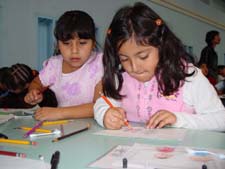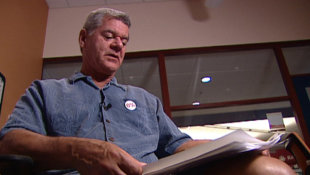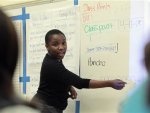Saturday, December 15, 2012
What is Next ?
Anyone who did not hear about the shooting yesterday at the kindergarten school in the United States would not have to be on the planet. This comes right on the heels right after a few weeks where there was a shooting at the mall. The thing with the United States is that this will be mourn until the dead are buried and then everyone except for those who suffered will go to their usual lives. How many more will have to suffer or die before America realizes that there is a problem with how their citizens have access to guns.
Those committing these crimes get younger with each tragedy. It is quite clear and speaks to what I have been saying that we have a generation that has no coping skills. The question remains as to what could have caused this young man to snap? Better yet why did this parent have guns in the home? As I listened to the many reports about the community being one of peace and harmony. I had to laugh inside, because what a shallow world we are living. What equates peace? What seems as peace on the outside is raging battle on the inside. How many homes in middle class America are raging war on the inside but yet appear as if all is well on the outside. Simple put we live in this false world where everyone has set false ideals for themselves. Too many persons are hooked on Hollywood, and current 21st parents have way too many falseexpectations for their children.
Who will reach out to these parents who have lost their children,and what can be said. No words or compensation can account for this great loss. Also while the news sensationalize this and we think about the victims,let's not forget about the perpetrator's family. The news is very insensitive in how it goes about to report news. What about this young man who used his brother's id which was broadcast around the world,not to mention this innocent young man being dragged off to jail handcuff. How will this young man hold his head up? What about his father who was so emotional that he was unable to talk, yet insensitive reporters couldn't understand why this man would be reluctant to comment having just lost his wife and son.
Yes, while we think about the victims let's also focus on the family of this young man whom had nothing to with this horrific act. So I ask the question again, what next? Will this be swept under carpet like all the others until another shooting. I somehow feel that this is not the last of shootings, so when will policy makers start talking.
Let's See!
Your comments.
Sunday, December 9, 2012
It's that time of Year
Christmas is here. Let's forget about ourselves this season, and think of someone who doesn't have a home,a job or love ones this season. Give the gift of love,love someone unconditionally. Give someone a hug. Love someone just because they deserve to be love. Forget about presents, forget about the food and think of someone who hasn't anyone or anything. It's that time of year to give,but let it not be something material, instead give of yourself.
Sunday, October 28, 2012
Halloween Literacy
It always amazes me how much many parents go out of out their way to accommodate trick or treating. Halloween is not apart of my culture so forgive me if I seem like a kill joy.I can see this being a fun time between families but I do not think that parents should spend so much money on this activity that last just a few hours.
Also with the crazy world we now live in, I wonder how many parents are looking at the bigger picture. Are they monitoring older children on these walks, and what about all the candies. Do children really have them.? Or rather do they need all this candy?
Seeing as I am not a kill joy,if Halloween must be celebrated then it is important that proper supervision is given to children and adults as well. Be aware of your surroundings as this is a perfect time for some demented person to disguise their wrong doing. Walk in groups and please search all candies given to children before they are consumed.
BE SAFE!
Sunday, September 30, 2012
New Literacies
How should teachers deal with new technology as students enter the classroom quite adaptive to technology? Read the article below and post your comments.
Literacy for the 21st Century: The Hope and the Promise
 |
A CML Reflection Resource
Since the beginning of recorded history, the concept of
"literacy" meant having the skill to interpret "squiggles" on a piece of
paper as letters which, when put together, formed words that conveyed
meaning. Teaching the young to put the words together to understand
(and, in turn, express) ever more complex ideas became the goal of
education as it evolved over the centuries.Today information about the world around us comes to us not only by words printed on a piece of paper but more and more through the powerful images and sounds of our multi-media culture. Although mediated messages seem to be self-evident, in truth, they use a complex audio/visual "language" which has its own rules (grammar) and which can be used to express many-layered concepts and ideas about the world. Not everything may be obvious at first; and images go by so fast! If our children are to be able to navigate their lives through this multi-media culture, they need to be fluent in "reading" and "writing" the language of images and sounds just as we also teach them to "read" and "write" the language of printed communications.
In the last 40 years, the field of media literacy education has emerged to organize and promote the importance of teaching this expanded notion of "literacy." At its core are the basic higher-order critical thinking skills of any well-educated person - knowing how to identify key concepts, how to make connections between multiple ideas, how to ask pertinent questions, formulate a response, identify fallacies and so on.
It also expands the concept of "text" to include not just written texts but any message form — verbal, aural or visual - (or all three together!) - that is used to pass ideas between human beings.
And full understanding of such a "text" involves not just "deconstruction" (analysis) activities but also "construction" (production) activities using a range of multi-media tools now available to young people growing up in today's media culture.
So, media literacy is not about discarding geography in order to have time for making videos; it's not about dropping Shakespeare in favor of Spielberg. Media literacy is just named that way until the day comes when the definition of "literacy" automatically incorporates the idea of fluency in both print and non-print forms.
Information Explosion
But there's more. Kathleen Tyner says in her landmark Literacy in a Digital Age, that media literacy or media education is more about education than it is about media!
 What
she means is that the goal of media literacy is not so much to study
what's on television, how advertising works or how to make a movie
(although it can include those activities) as it is to explore how human
beings can interpret ("read") and "make sense of" the complex media
culture in which we swim. A multi-media message can be the "text" under
discussion but the skills to be learned include questioning how an image
is composed, analyzing what it might mean to different people,
evaluating it against other concepts and principles I believe in and
ultimately developing and creating a response ("writing") so that others
can know what I now know.
What
she means is that the goal of media literacy is not so much to study
what's on television, how advertising works or how to make a movie
(although it can include those activities) as it is to explore how human
beings can interpret ("read") and "make sense of" the complex media
culture in which we swim. A multi-media message can be the "text" under
discussion but the skills to be learned include questioning how an image
is composed, analyzing what it might mean to different people,
evaluating it against other concepts and principles I believe in and
ultimately developing and creating a response ("writing") so that others
can know what I now know.At the same time that our multi-media culture is expanding the notion of "text" to be analyzed, the proliferation of technology is transforming how human beings acquire knowledge and pass it to one another. No longer do we need to accumulate all the information we may need for a lifetime. What we need to know is how to find and then manage the information needed at a particular time for a particular task. We need to know how to process the information that we can now so easily retrieve through technology.
This explosion in information has presented a major challenge to the world of formal education. For centuries, schooling has been designed to make sure students learned facts - which they proved they knew by correctly answering questions on tests. But such a system no longer works when facts-for-life are not needed! What is needed today is for students to learn how to learn, how to find what they need to know when they need to know it. And to have the thinking skills to critically analyze and evaluate whether the information they find is useful for what they want to know.
How will schools do this?
First, schools and classrooms must be transformed from being storehouses of knowledge to being more like portable tents providing a shelter and a gathering place for students as they go out to explore, to question, to experiment, to discover!
 Secondly,
to use a phrase from the great Brazilian educator, Paolo Freire,
teaching must be distinguished from "banking." No longer is it
necessary for teachers to deposit information in students' heads.
Teachers no longer have to know all the answers, to be a "sage on the
stage." Instead teachers are becoming a "guide on the side:" encouraging
. . . guiding . . . mentoring . . . supporting the learning process.
Creative classrooms today are ones where everyone is learning, including
the teacher!
Secondly,
to use a phrase from the great Brazilian educator, Paolo Freire,
teaching must be distinguished from "banking." No longer is it
necessary for teachers to deposit information in students' heads.
Teachers no longer have to know all the answers, to be a "sage on the
stage." Instead teachers are becoming a "guide on the side:" encouraging
. . . guiding . . . mentoring . . . supporting the learning process.
Creative classrooms today are ones where everyone is learning, including
the teacher!Thirdly, curriculum, classes and activities must be designed that will engage students in problem solving and discovery, in learning how to learn. Some call it "inquiry-based learning." Using today's multi-media culture, which includes print but is not limited to it, provides a nearly limitless resource for acquiring a range of skills, e.g. how to identify "point of view" by examining how camera angles influence how we think about the subject being photographed or how to determine whether information is bogus or not by learning to evaluate websites on the Internet.
The transformation of our culture from an Industrial Age to an Information Age is why a new kind of literacy, coupled with a new way of learning, is critical in the 21st century.
At the Center for Media Literacy, we hope that the theory and practice of media literacy education, along with the resources, information and networking available at this website, will provide the framework — and the tools — to bring the promise of an empowering 21st century literacy to every child, every home, every school in America.
Sunday, September 23, 2012
One Small Step For Literacy
Hernando
Guanlao has set up an informal library outside his central Manila home
to encourage his community to share in his joy of reading, BBC News reports.
In 2000, Guanlao put his collection of books — he owned fewer than
100 — outside the door of his house, offering them to anyone who wanted
to borrow them.People did. They even added to his collection.
There are now close to 3,000 books — he doesn't keep an inventory as numbers are always changing — on the shelves and boxes stacked outside his door.
"It seems to me that the books are speaking to me. That's why it multiplies like that," he says of his unadvertised library, dubbed the Reading Club 2000. "The books are telling me they want to be read…they want to be passed around."
Locals call it "the library on Balagtas Street." Guanlao insists there are no rules at his library, and people can borrow the books for as long as they want, or even keep them permanently.
"People can borrow, they can read, they can take home. In fact, the club is open 24/7. I never close," he tells the Philippine Daily Inquirer.
Despite the Philippines' very high literacy rate, access to books in the country, especially among the poor, is limited.
Guanlao reaches Manila's poorest communities on his "book bike." He loads a large basket with books and delivers them to families who can't afford to buy books or make the long trek to the national library.
Guanlao is also starting to branch out, helping two other men set up similar ventures in other provinces. Eventually, he hopes to set up a "book boat" that would travel around the islands of Sulu and Basilan, "an area better known as a hideout for separatist rebels than for any great access to literature," BBC News reports.
"A book should be used and reused. It has life, it has a message," he says. "As a book caretaker, you become a full man."
Monday, September 3, 2012
Losing our Good Teachers
I came across this article and I felt a feeling of loss as I feel that very soon we will be losing our good teachers all because we now have a generation of parents who seem to be more interested in enabling their children than teaching them about the real world around them. Teachers are no longer to correct them or give deserved marks. I wonder what type of world are we creating in the future if the next generation is not equipped to deal with it. Read the article below and tell me your thoughts because this is happening all too often these days in our education system. I myself am becoming quite disheartened with teaching at the lower level because of the behavior of parents. It is becoming more and more difficult to teach from the heart.
Edmonton teacher Lynden Dorval may lose job over zeroes
 Suspended teacher Lynden Dorval faces a termination hearing next month. The Edmonton Public School Board has a No-Zero Policy. When 61-year-old Lynden Dorval continued to dole out zeroes to students who failed to hand in assignments last year, he was suspended.
Suspended teacher Lynden Dorval faces a termination hearing next month. The Edmonton Public School Board has a No-Zero Policy. When 61-year-old Lynden Dorval continued to dole out zeroes to students who failed to hand in assignments last year, he was suspended."I have been told that termination often results in withdrawal of teaching certificate, which means I may not be able to teach anywhere," Dorval told CTV's Canada AM from Edmonton Friday.
In principal Ron Bradley's letter to Dorval, he cites Dorval's failure to mark and return tests in a timely manner following his mid-May suspension as contributors to his recommended dismissal:
"Your habitual refusal to obey lawful orders, your repeated insubordination, and your obvious neglect of duty force me to consider recommending termination of your contract with Edmonton Public Schools," Bradley wrote.
Dorval responded that when he was suspended for his stand against the No-Zero policy, he was told to turn in his keys and pack up his belongings at once — and claims he didn't realize he hadn't returned some of the exams until the school notified him of the issue.
"All of this confusion could have been easily avoided by allowing even one day of transition to allow me to walk the new teacher through what he need to prepare and we could have easily identified any missing evaluation material…I turn your own words back on you: If you were so concerned with the achievement of those students, then why did you so abruptly terminate my teaching and replace me with an inexperienced teacher?" Dorval rebutted.
Read both letters in full at the Edmonton Journal.
The Edmonton Public School Board is set to review the No-Zero approach this fall.
"That's why I'm still doing this," Dorval told the Canadian Press, determined to fight both his dismissal and the no-zero policy.
"Otherwise I would just let the termination go through. But I think to keep it in the public mind and eye is the most important thing that needs to be talked about because a lot of parents, even some of the trustees I'm sure, didn't know these kinds of policies are in place."
Those in support of the No-Zero policy claim that zeroes don't reflect what a student knows about a subject — unfinished work should be treated as a behavioural issue, not an academic one — nor zeroes encourage improvement. Instead, students should be given "incomplete" grades when they fail to hand in work. They are then expected to do make-up assignments.
Dorval, a physics teacher for 35 years, claims this approach doesn't prepare students for the real world, nor are students motivated by the more lenient grading system.
"The students need to develop that intrinsic motivation to do it on their own," Dorval told the National Post.
"There's actually no research that backs what they're doing; it's simply a philosophy. I believe it damages students to allow them to just get away with not doing any work. They say that giving out zeros damages their esteem and makes them give up. But in my experience, that's not true at all," he told CTV News.
When the Edmonton Journal polled its readers last summer, 97 per cent of them believed a zero is an appropriate mark on an assignment that isn't handed in.
Dorval is set to appear before the superintendent on September 10th to address the call for dismissal.
[ More Daily Brew: Alberta research find common gut virus may be potent ca
- Obama vs. Romney 101: 5 differences on education
President Obama has used back-to-school season to make the case that his education funding and policy initiatives are saving … Full Story »Obama vs. Romney 101: 5 differences on education
- All Comments
-
 dozertank • 2 days 23 hours ago
dozertank • 2 days 23 hours ago -
 TheAntiHarper • 2 days 15 hours ago
TheAntiHarper • 2 days 15 hours ago-
 elea 18 hours ago
elea 18 hours ago
-
-
 Crys B • 2 days 17 hours ago
Crys B • 2 days 17 hours ago -
 Frank Connors • 2 days 16 hours ago
Frank Connors • 2 days 16 hours ago-
 Brian 1 day 7 hours ago
Brian 1 day 7 hours ago
-
-
 raylew3 • 2 days 17 hours ago
raylew3 • 2 days 17 hours ago-
 Jully 1 day 10 hours ago
Jully 1 day 10 hours ago
-
-
 pancho villa • 2 days 16 hours ago
pancho villa • 2 days 16 hours ago-
 Marianne 1 day 18 hours ago
Marianne 1 day 18 hours ago
-
-
 G C H • 2 days 16 hours ago
G C H • 2 days 16 hours ago-
 canadiangirl 1 day 14 hours ago
canadiangirl 1 day 14 hours ago
-
-
 A Yahoo! User • 2 days 16 hours ago
A Yahoo! User • 2 days 16 hours ago -
 Dave • 2 days 23 hours ago
Dave • 2 days 23 hours ago -
 unscrat • 2 days 17 hours ago
unscrat • 2 days 17 hours ago -
-
 bryan m • 2 days 16 hours ago
bryan m • 2 days 16 hours ago -
 canuck 111 • 2 days 17 hours ago
canuck 111 • 2 days 17 hours ago -
 lirechek • 2 days 16 hours ago
lirechek • 2 days 16 hours ago
More
Post a comment
- Northwest Passage voyage shows climate change impact on Arctic Sat, 1 Sep, 2012
- Targa Newfoundland car rally targeted over logo on driver’s racing suit Fri, 31 Aug, 2012
- Protesting owners swap firearms in ‘Great Canadian Gun Registry Shuffle’ Fri, 31 Aug, 2012
ADVERTISEMENT
|
Blog Authors / Profiles
-
Jordan Chittley, Associate Editor
-
Tori Floyd, Associate Editor
-
Chase Kell, Associate Editor
-
Steve Mertl, National Affairs Contributor
-
Jordana Divon, National Affairs Contributor
-
Nadine Bells, Good News Writer
Latest from Twitter
- Another Labour Day, another bad year for Canada's unions http://t.co/EUPbTdO7 They're losing at the negotiating table and in public opinion
| ADVERTISEMENT |
Subscribe to:
Comments (Atom)

















